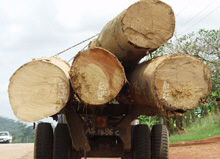
Typical street scene in Santa Ana, El Salvador. (Photo: iStock)
IMF Survey: IMF Gathers Ideas on Best Use of Natural Resources
March 16, 2012
- IMF seeks suggestions on taxation, management of natural resources
- Deadline for comments is April 27, 2012
- Aim is to improve advice on using natural resources in country development
The International Monetary Fund (IMF) has launched a consultation process with the private sector, civil society, academics, and others to gather ideas about the best use of natural resources for boosting living standards in developing countries.

Lumber in transit by road near Accra, Ghana. Countries that have natural resources face issues arising from exhaustible, volatile revenues (IMF photo)
CONSULTATION PROCESS
The boom in global commodity prices and new discoveries of resources such as oil, gas, and minerals offer vast opportunities for economic development in many low- and lower–middle income countries.
The IMF is seeking views on the best ways to tax natural resources, and how to use the money earned to boost standards of living in the countries that own them.
Avoiding the pitfalls
Developing countries face important economic policy challenges in trying to realize the full development potential of their natural resources and to avoid the pitfalls that have previously plagued some countries that are rich in resources but often do not see the full benefit of them.
The IMF, which provides policy suggestions and technical expertise on economic issues, aims to promote a discussion on the use of natural resources in development and to reassess its policy advice for resource-rich low-income and lower–middle income countries. The objective is to take a fresh look at the IMF's policy advice in light of past experience, the growing importance of natural resources in many economies, and new insights from recent research. Comments can be channeled through a special webpage. The deadline is April 27.
Countries that have natural resources face macroeconomic challenges from exhaustible and volatile revenues, complicating the desire to scale up spending to close the infrastructure gap that these countries face.
How fast can these countries scale up spending without compromising macroeconomic stability? What are features of appropriately designed fiscal policy frameworks for those types of economies, and how can the sustainability of external positions (such as the current account and exchange rate) be assessed?
An opportunity not a waste
To ensure that natural resources provide an opportunity to promote economic and social development, build skills, and close infrastructure gaps, several economic policy challenges must be addressed. These policy challenges extend to areas such as resource taxation, fiscal policy design, sustainability of external balances, the impact of resource booms on exchange rates, and complex linkages between resource and nonresource sectors.
For instance, governments must try to balance a country's interests with those of companies charged with finding, developing, and extracting the resources. Companies must pay their fair share of taxes, and country budgets must cope with ups and downs in commodity prices and thus unpredictable revenues.
The IMF is preparing two papers for the institution’s Executive Board—Natural Resources Wealth Management and Taxation of Natural Resource Rents—on these issues and will incorporate comments gathered in the consultation process.
Kinshasa conference
As part of the consultation process, the IMF is hosting a conference in Kinshasa with the Democratic Republic of Congo, on March 21–22 on the management of natural resources in sub-Saharan Africa.
For many countries in sub-Saharan Africa, extractive industries—oil, forestry, mining—account for a significant share of output and a major share of export earnings. Rising commodity prices have further boosted economic growth and exports in many countries.
The goal of the conference is to present the latest analysis and thinking on macroeconomic policies and the management of natural resource revenue, and elaborate on how this might affect the policy dialogue with countries in the region. It will also cover tax policy, administration, and regulatory frameworks conducive to good management of natural resources with particular focus on how to make them work in the context of weak institutional capacity.


